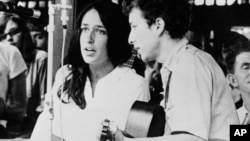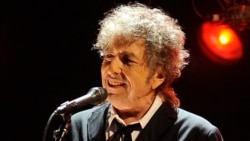Fifty years ago this weekend, singer/songwriter Bob Dylan took the stage at the Newport Folk Festival and delivered a performance that got him booed – and also helped change the direction of music and culture in the United States.
In the mid-1960s, the times they were indeed a-changin'. One of the places those changes were being felt was the world of folk music, says rock historian Elijah Wald, author of a new book, "Dylan Goes Electric."
"There was a moment in the early '60s where you could look at the Billboard chart and seven of the top 10 albums were folk records," he said. "And Joan Baez, Peter Paul and Mary, the Kingston Trio – all had huge, huge, huge No. 1 records."
And then all that changed.
In 1964, the Beatles had hit and by the summer of 1965 "a lot of people in the folk scene were sort of feeling like their world was threatened," Wald said.
They were hoping that Bob Dylan would come to the rescue. Dylan had become a legend in folk music circles, both as a powerful songwriter and a distinctive singer. Most of the crowd at Rhode Island's Newport Folk Festival on the evening of July 25, 1965, were expecting to hear something like "Blowin’ in the Wind." Instead, when Dylan took the stage they heard "Maggie’s Farm."
Dylan had gone electric, and the folk purists didn’t like it one bit.
"And when Dylan went electric, I think one of the issues was the feeling that – wait a minute, he’s gone over to the enemy," Wald said.
Once they recovered from the shock, the audience expressed their displeasure. They booed.
Folk fans had looked to Dylan to save their movement from the rock 'n' roll onslaught, but "Dylan had always liked rock 'n' roll and Dylan didn’t think of rock 'n' roll as stupid music," said Wald.
Fan of the Fab Four
In fact, Dylan was a Beatles fan. He would later say that from the first time he heard the Beatles he knew "they were pointing to the direction where music had to go."
"Honestly, once the Beatles hit, I think the writing was on the wall. But when Dylan went with the Beatles on that one, that was that.… That was essentially the end of the folk scene as a huge mainstream pop trend,” said Wald.
Defining moment
Beyond the music, Dylan’s performance that night also marked a turning point in American culture.
"There are two halves to the 1960s," said Wald.
What he meant was: just picture Martin Luther King Jr.’s 1963 March on Washington – most of the protesters are wearing suits. You’d never see that in the hippie days of the late '60s.
"Before 1965, [it] was really a different world, and it’s the '60s of the civil rights movement, and of folk music and of joining arms across the generations and across the races," Wald said. "And after 1965, it’s the world of rock…. I’m not saying that Dylan created that change, but I do think that the confrontation at Newport happened because it was symbolic of that much larger confrontation, and has been remembered because it really is sort of the moment of rupture where the new '60s emerged."






